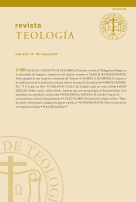Por favor, use este identificador para citar o enlazar este ítem:
https://repositorio.uca.edu.ar/handle/123456789/6950| Título: | “Y el logos era Dios” : comentario de Orígenes al evangelio de Juan | Autor: | Zañartu, Sergio, S.I. | Palabras clave: | Orígenes, 185-254; EVANGELIOS; LOGOS; DIOS; ENCARNACION; EVANGELIO DE SAN JUAN | Fecha de publicación: | 2012 | Editorial: | Universidad Católica Argentina. Facultad de Teología | Cita: | Zañartu, Sergio. “Y el logos era Dios” : comentario de Orígenes al evangelio de Juan [en línea]. Teología, 108 (2012) Disponible en: https://repositorio.uca.edu.ar/handle/123456789/6950 | Resumen: | Resumen: El autor pretende dar una visión de conjunto sobre el Logos según este Comentario al evangelio de Juan. El Logos es realmente Dios, porque es eterno y porque se diferencia substancialmente de toda creatura (creada de la nada), las cuales son creadas por el Padre mediante él. Es el unigénito, el Hijo por naturaleza. Con todo, sólo el Padre es Dios por antonomasia. El Logos es Dios (sin artículo), porque vive contemplando al Padre. Es el intermediario para la divinización de las creaturas. Las creaturas lógicas participan de él, son la imagen de la imagen. El Padre es el prototipo y el Logos el arquetipo. El Padre es mayor que el Logos, porque es la fuente. El Espíritu, tercera hypóstasis, no es hijo, porque viene por intermedio del Hijo. El Hijo, eternamente engendrado, nace del Padre como la voluntad del entendimiento, como el resplandor de la luz. Orígenes distinguió claramente las hipóstasis, pero no tuvo vocabulario suficiente para expresar su unidad, como lo hará Nicea. La visión de Orígenes sobre la Trinidad esmás bien dinámica.Nosotros debemos subir hasta el Logos Dios, que estaba en el principio hacia Dios. Entonces, como hijos, contemplaremos al Padre. Así es la grandiosa visión de la salida del Padre y vuelta a él. Respecto a la Encarnación, Orígenes tiene aciertos y desaciertos. Abstract: The author aims to give an overall view of the Logos as found in this commentary on John. The Logos is really God, because he is eternal and because he differs substantially from every creature (created from nothing), all of which are created by the Father through him. He is the only begotten, the Son by nature. Above all, because only the Father is God by antonomasia. The Logos is God (without the article) because he lives contemplating the Father. He is the intermediary in the making creatures divine. The Logoscreatures share in him; they are the image of the image. The Father is the prototype and the Logos is the archetype. The Father is greater than the Logos because he is the origin. The Spirit, the third in the hypostasis, is not the Son, because he comes by means of the Son. The Son, eternally begotten, is born from the Father as the will to understand, as the splendor of light. Origen clearly distinguishes the hypostasis but he had not sufficient vocabulary to express its unity, as Nicaea had. The vision of Origen of the Trinity is more dynamic. We must rise up to the God- Logos, who was from the beginning directed to God. So, as children, we will contemplate the Father. Such is the imposing vision of the coming from the Father and returning to him. With regard to the Incarnation Origen got some things right and some wrong. |
URI: | https://repositorio.uca.edu.ar/handle/123456789/6950 | ISSN: | 0328-1396 | Disciplina: | TEOLOGIA | Derechos: | Acceso Abierto | Fuente: | ISSN 0328-1396 |
| Aparece en las colecciones: | TEO - 2012 Tomo XLIX nro. 108 |
Ficheros en este ítem:
| Fichero | Descripción | Tamaño | Formato | |
|---|---|---|---|---|
| logos-era-dios-zanartu.pdf | 213,28 kB | Adobe PDF |  Visualizar/Abrir |
Visualizaciones de página(s)
2.155
comprobado en 30-abr-2024
Descarga(s)
315
comprobado en 30-abr-2024
Google ScholarTM
Ver en Google Scholar
Este ítem está sujeto a una Licencia Creative Commons

